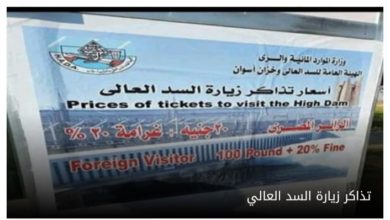بيان رئاسي من الرئيس السيسي بمناسبة النسخة الرابعة من أسبوع إعادة الإعمار والتنمية ما بعد النزاعات
بيان رئاسي من الرئيس السيسي بمناسبة النسخة الرابعة من أسبوع إعادة الإعمار والتنمية ما بعد النزاعات
متابعة / كامل شحاته
يطيب لي بصفتي رائد الاتحاد الأفريقي لملف إعادة الإعمار والتنمية فيما بعد النزاعات أن أعلن عن إطلاق فعاليات النسخة الرابعة لأسبوع الاتحاد الأفريقي للتوعية بإعادة الإعمار والتنمية بعد النزاعات، والذي يُقام هذا العام خلال الفترة من ۱۸ إلى ٢٤ نوفمبر ٢٠٢٤، تحت عنوان “استراتيجيات ومسارات التعاون المشترك من أجل التنفيذ الفعال لسياسة الاتحاد الأفريقي لإعادة الإعمار والتنمية بعد النزاعات”.
إن التحديات الأمنية والتنموية المُتعددة والمتزامنة التي تواجهها قارتنا الأفريقية تحتم علينا معالجة الأسباب الجذرية للنزاعات، وبناء قدرات المؤسسات الوطنية والإقليمية والقارية التي تعزز قدرة دولنا على الصمود ومواجهة التحديات الداخلية والخارجية المعقدة، والسعي للتوصل إلى حلول سلمية مستدامة للأزمات القائمة، ما يساهم في بناء واستدامة السلام والحيلولة دون انزلاق المجتمعات مرة أخرى إلى دائرة العنف والصراع، مع تعزيز وتفعيل الرابط بين السلام والأمن والتنمية، وهي الموضوعات التي ناقشناها وغيرها باستفاضة في النسخة الرابعة من “منتدى أسوان للسلام والتنمية المستدامين” التي عُقدت بالقاهرة في شهر يوليو الماضي، والتي شهدت كذلك إطلاق العديد من المبادرات التي تعزز الملكية الأفريقية لجهود السلم والأمن والتنمية، كان أبرزها تدشين الشبكة الأفريقية لمنع التطرف المؤدي إلى الإرهاب”، والإعلان عن جائزة “منتدى أسوان” لإعادة الإعمار والتنمية تثميناً وتشجيعاً للنماذج والمشروعات الناجحة في بناء السلام في القارة الأفريقية.
إن نجاح جهودنا لبناء واستدامة السلام قد حتم علينا تطوير مقاربة أفريقية استراتيجية شاملة ومتماسكة لمنع النزاعات وبناء واستدامة السلام، تتكامل فيها الجهود الوطنية والإقليمية والقارية، وهو ما أمكن تحقيقه من خلال تحديث وتطوير سياسة الاتحاد الأفريقي لإعادة الإعمار والتنمية بعد النزاعات، والتي أقرها القادة الأفارقة في قمة الاتحاد الأفريقي الماضية في فبراير ٢٠٢٤.
والآن، فإن تركيزنا سينصب على تفعيل وتنفيذ السياسة الجديدة، بدءاً بالترويج والتعريف بها من خلال أنشطة أسبوع إعادة الإعمار لهذا العام، وتطوير التوجيهات الإرشادية لتنفيذ السياسة المنقحة، مروراً ببدء مركز الاتحاد الأفريقي لإعادة الإعمار والتنمية ما بعد النزاعات للعمل من مقره في القاهرة لتطوير المبادرات والمشروعات لتقديم الدعم للدول الخارجة من النزاعات وتلك التي تمر بمراحل انتقالية، باعتباره الذراع التنفيذي للاتحاد الأفريقي في مجال بناء السلام، وانتهاء بالتنسيق والعمل الوثيق مع الشركاء وحشد التمويل والموارد اللازمة لتنفيذ تلك المشروعات.
ولا يفوتني أن أثمن جهود مفوضية الاتحاد الأفريقي في دعم تنفيذ أنشطة إعادة الإعمار وبناء السلام في ربوع القارة، وأؤكد من منطلق ريادتي للملف على التزامي الشخصي بالاستمرار في بذل قصارى جهدي بالتنسيق مع أشقائي القادة الأفارقة، ومفوضية الاتحاد الأفريقي، وأصحاب المصلحة الإقليميين والشركاء الدوليين للاستجابة للتطلعات المشروعة لأبناء القارة، وتحقيق أهداف أجندة أفريقيا ٢٠٦٣.
———————
It gives me great pleasure, as the African Union Champion for the Post-Conflict Reconstruction and Development dossier, to announce the launch of the 4th edition of the African Union Week for Awareness of Post-Conflict Reconstruction and Development. This year’s edition will be held from November 18-24, 2024. It will be held under the theme “Joint Strategies and Pathways for the Effective Implementation of the African Union Policy on Post-Conflict Reconstruction and Development”.
The multiple and simultaneous security and development challenges facing our African continent make it incumbent upon us to address the root-causes of conflicts; build the capacities of national, regional, and continental institutions that foster the ability of our countries to withstand and confront the complex internal and external challenges; and strive to reach sustainable peaceful solutions to the existing crises. This shall contribute to building and sustaining peace and prevent societies from sliding back into cycles of violence and conflict, while strengthening and activating the connection between peace, security, and development. These are the topics we discussed thoroughly, among others, during the fourth edition of the ‘Aswan Forum for Sustainable Peace and Development,’ which was held in Cairo last July. The forum also saw the launch of several initiatives that reinforce Africa’s ownership of efforts in peace, security, and development. The most prominent of these initiatives were the establishment of the ‘African Network for the Prevention of Violent Extremism Conducive to Terrorism,’ and the announcement of the ‘Aswan Forum Prize for Reconstruction and Development’, which aims to celebrate and encourage successful models and projects in peacebuilding across the African continent.
The success of our efforts to build and sustain peace has necessitated the development of a comprehensive and coherent strategic African approach to conflict prevention, peacebuilding, and sustaining peace. This approach integrates national, regional, and continental efforts. This was achieved through the updating and development of the African Union’s Policy on Post-Conflict Reconstruction and Development, which was endorsed by the African leaders at the last African Union Summit, in February 2024.
Our focus now shifts to the activation and implementation of the new policy. We will begin by promoting and raising awareness through the activities of this year’s Reconstruction Week. We will also develop guidelines for the implementation of the revised policy. Furthermore, the African Union’s Center for Post-Conflict Reconstruction and Development will start operations from its Cairo headquarters to develop initiatives and projects that seek to provide support to post-conflict and transitional states, serving as the African Union’s executive arm in peacebuilding. Finally, we will coordinate and work closely with partners and mobilize the necessary financing and resources to implement these projects.
I would like to commend the efforts of the African Union Commission in supporting the implementation of reconstruction and peacebuilding activities across the continent. As the champion of this dossier, I reaffirm my personal commitment to continue working tirelessly in coordination with my fellow African leaders, the African Union Commission, regional stakeholders, and international partners to respond to the legitimate aspirations of the peoples of our continent and achieve the goals of Africa’s Agenda 2063.






